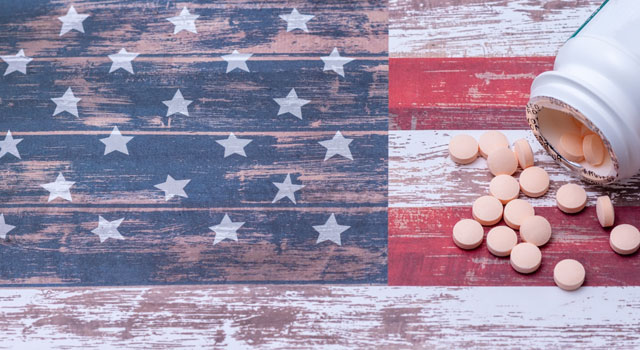What would this country look like if people struggling with addiction were not arrested for it? It is understandable, from an outsider’s perspective, that people using and selling drugs should be punished for their drug-possession. Yet, those of us who have been through it and have come out the other side can attest to the fact that we had literally lost all control and most rational thought.
A group of lawmakers in Colorado understands that reality. By introducing a bill throughout the state that would lessen the sentences on people arrested for drug possession, they hope to stop the cycle of incarcerating drug addicts and encouraging treatment instead.
The Bill
HB19-1263 is some Colorado lawmakers bill at an attempt to help more locals suffering from drug addiction. The bill would defelonize the possession of all Schedule I and II drugs throughout the state.
This would include small amounts of heroin, fentanyl, acid, and cocaine.
The term “defelonize” does not mean that any individual found to be in possession of these drugs would not still be eligible for jail time, but it does mean that the person would not be permanently followed by a felony charge.
First timers who are arrested for drug-possession with these Schedule I or II drugs would still have to appear in court and be sentenced by a judge, and they will still most likely 180 days in jail and be expected to perform some sort of community service.
The Goal
The War on Drugs was officially called into effect almost 50 years ago, and according to Democratic Rep Leslie Herod of Denver, it was an effort that, “Has completely failed”.
Many people are aware of the underlying tones of racial profiling that occurred because of it, and how the population punished during the war on drugs has been primarily young black males and impoverished Americans.
These particular Colorado lawmakers aim towards putting an end to “arresting-away” the drug problem, which will, in turn, save Coloradans millions in taxpayer dollars. Leslie states, “The (current) system is broken, and this is a way to fix it.”

The Potential Benefits
If this bill to defelonize drug-possession does, in fact, get passed, those in favor of it claim it could benefit the lives of all Coloradans. Their main selling points for the bill are:
- the bill has been projected to save taxpayers anywhere from $8.6 to $13.7 million over the next five years.
- The bill would encourage more treatment for people with addiction, rather than jail time
- People struggling with addiction would not have permanent felony charges, making the reintroduction to life easier
These improvements are obvious in the benefits they would bring to the state, but underneath them lie many more for those who actually struggle with addiction.
Imagine if you or your loved one didn’t have to worry about that felony charged once they graduated from rehab. Imagine if that level of finding housing, finding a job, or applying for a loan wasn’t immediately taken away from them.
The hard truth is that, for many recovering addicts and alcoholics, who made mistakes during their addiction, the price of their previous actions have the power to hold them down for years into sobriety. The weight of these burdens, and the complications of trying to live again despite them, often leave many in recovery feeling hopeless.
What about the Coloradans who have not struggled with addiction or been caught with drug-possession? If the benefits of this bill for the average person would mean millions saved in tax dollars, those funds would be viable towards improving infrastructure, funding education systems, and maintaining the lands. Would it encourage other states to follow suit and do the same?
It has been made very clear that incarceration usually falls short of its intended purpose, and many people are usually left worse off than before. Drug use and violent crimes are rampant throughout prison walls, so why are we so quick to send addicts in there to “straighten out”? An increase in substance abuse treatment for addicts and alcoholics would lend better results than a minimum sentence in prison, with little access to recovery tools and community spirit.
A Current Example
The state of Oregon has already passed a similar bill that defelonize drug-possession, which has been in effect since early 2018. This bill states that all first-time drug-possession charges will be served under the same sentencing as a Class-A misdemeanor, similar to a DUI.
For those who have a previous drug-possession felony or two drug-possession charges, they will not be given the grace of this lighter sentencing.
Since the bill was passed in Oregon, felony drug-possession charges have plummeted:
- Around the state, drug convictions fell 44% from 5,145 to 2,889 in one year
- In one county alone, drug-possession charges fell 41%
However, other reports indicate that homelessness has skyrocketed, but this has not yet been linked to the new bill or simply travelers heading to Portland, a city which has long been known to be a haven for train hoppers and backpackers.
Looking Forward
It still remains unclear whether or not Colorado will choose to defelonize drug-possession over the next year. While for many it could mean the opportunity to get help from drug addiction without facing severe jail time, it could also prove to have potential blow-back in the early days.
The most positive aspect of this bill and the one passed in Oregon should simply be that many lawmakers are choosing to view drug addiction as something that can be overcome in healthy ways, rather than as a mere lack of moral fortitude among the “kids these days”.
If more politicians around the country were willing to speak about drug addiction and drug-possession as a mental health crisis, it might just help open the doors for many who would otherwise not have an opportunity to seek treatment.
